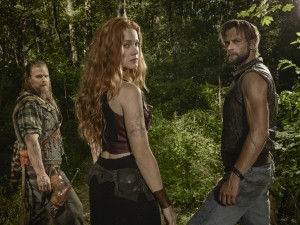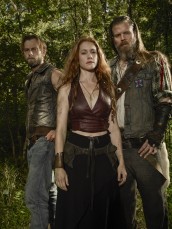
Joe Anderson as Asa, Gillian Alexy as G'winveer and Ryan Hurst as Lil Foster in OUTSIDERS | © 2016 WGN
In WGN America’s new drama series OUTSIDERS, premiering Tuesday, January 26, an isolated community of people in the Appalachias wants to be left alone to go their own way, just as their forebears have for over two hundred years. There are problems brewing without and within. A mining company wants to evict the community residents and blow up the mountaintop to get to the coal beneath, and Big Foster, played by David Morse, has managed to put his mother in a coma in his quest to take over the leadership of the Farrell clan.
Peter Mattei, who created OUTSIDERS, and his fellow executive producer Peter Tolan (who with Denis Leary co-created RESCUE ME) sit down to talk about their unconventional tale of culture clash.
AX: When you first came up with the idea, was it always as it is now, or did you imagine setting OUTSIDERS perhaps somewhere else? Was it always the Appalachias?
PETER MATTEI: It’s a good question. Originally, I wasn’t sure where to set it. I knew it was a bunch of people living on a mountain, and they would be threatened with eviction, and I thought it could be Northern California, or it could be anywhere. And then I realized that I knew some people involved in that kind of mountaintop-removal activism, and I realized that that was just incredibly dramatic, the idea that someone would want to actually blow up the mountain, not just kick them off. And so I realized it had to be set in Appalachia, and so I did a little bit of research about it then, and then that sort of colored and flavored who the Farrells were and where they would come from and what they would look like and sound like and so on.
AX: When you got involved with it, what was the appeal for you? And how do the two of you work together?
PETER TOLAN: I don’t know. I think at a certain point in production, we decided to switch off scripts, so I would take one and do it – we didn’t do that initially. Initially, it was a really unusual situation, in that the world was so unique and so much Peter’s creation that other people didn’t quite know how to write it. So initially, we had other people writing early episodes, but eventually, they sort of all were written by Peter. And I just kind of, as Peter said [earlier in the day], what was the word you used? – I kind of winged it. I just spit something out that was really kind of inspiration, but not really knowing where it was going to go, or what the world really was like. It’s very easy to write that So-and-So is covered in runic tattoos, but it’s another thing to actually envision what that means literally, and design it, and make it work, so we were all kind of I think floundering, certainly I was, in the early days, to figure out what this show really was.
MATTEI: I think the network was a little apprehensive early on, having picked this up for thirteen episodes. If we were having trouble as the writers, going, “Yeah, now, what exactly are we …?” I think they were like, “Hmm, what have we done here, what have we picked up?” So it was a little dicey for awhile there, but I think once the writing started to jell and then definitely once we actually put stuff on camera, you saw the cast and everything like that, people went, “Ah, okay, that’s interesting.” And the network was much more hopeful at that point, and then, as time went on, became much more supportive, I think, they made the right choice [laughs].
AX: Who does the title OUTSIDERS refer to? Does it refer to both the people on the mountain and their view of the people in the ordinary town down the mountain?
MATTEI: Yeah. We’re not picking sides here. Everybody in this show – there are layers and layers of outsiders. There are outsiders among the mountain people, Asa [the character who has been in the larger world for a time but comes back to the close-knit community, played by Joe Anderson] is an outsider in a way, there are outsiders among the townspeople. Sally-Ann [played by Christina Jackson] is an outsider, that’s why they’re connected together, but to each group, the other is the outsider.
TOLAN: And people in rural Appalachia are outsiders by definition to most of America, so everybody’s an outsider.
AX: Can you talk about the Farrell clan up on the mountain?
MATTEI: Actually, the clan is made up of three families – the Farrells, the Shays, and the McGintocks, and we’re just mostly seeing the Farrells at this point.
AX: What is their definition of “freedom?” Living in that kind of isolation, they’re probably subject to a higher level of neighborly and familial scrutiny than most of us living in a city. Everybody knows everybody’s business and has a rule they can quote about it, so what is their definition of freedom?
MATTEI: On the one hand, I would say it’s to be left alone up on their mountain, but you’re right, that like any close-knit family living in a quote-unquote more primitive way than we are, there is no privacy. In most parts of the world, people would go their entire lives without ever sleeping alone in a room, because you’re always sleeping with your brothers and your sisters, and your spouse and your kids. You’re never, ever alone. I think that’s true of the Farrells as well. But I think that they would think that that’s a form of freedom, because they also, if they’re in need, there’s always someone to help them, because they are such a tight-knit family.
TOLAN: You know what’s interesting about your question, in a way, is, it makes me want to ask [Mattei] a question. I mean, everybody bitches, we’re in the land of the free, right? And yet we go, “Ah, I wish I didn’t have to pay taxes, I wish I didn’t have the police pulling me over and giving me a ticket.” There are all these things that are restrictions on freedom. The Farrells, meantime, have been up there for two hundred, two hundred and fifty years. They’ve always been free, so how do they define freedom? Because they’ve always been free. What do you think initially they were escaping from, or was it even an escape to go up that mountain?
MATTEI: I think in my imagination, it was an escape from being conscripted into the Revolutionary War Army, for example, just being told how they would live. I’ll just tell a weird little story. The first people that came from England to America to live, the first settlers, one of the first groups, they settled on Roanoke Island off the coast of Virginia. And that island was fairly free of natives, and so they could live there safely. There was another island, not far away, called Croatan, that was heavily inhabited by Native Americans. These people were left off to live, and the boat went back to England. A year later, the boat comes back with some other people to check on them, see how they’re doing. They’re gone. No sign of them, and they left one sign carved into a tree that said, “Gone to Croatan.” So the very first settlers in America decided that they wanted to be Native Americans, and they went and lived with the Native American tribe, assimilated with them and disappeared.
So I think that the Farrells came to this country and they looked at their possibilities of basically like working on plantations, say, like on a tobacco plantation, being conscripted into an army, having to pay taxes, suddenly having to buy property as opposed to just living wherever you wanted to live and all these kinds of things, and that’s not what they wanted. They came here to live in the wilderness, and so they found their wilderness to live in.
AX: There are so many different intertwined storylines in OUTSIDERS, with Big Foster’s attempt to take over, Asa’s ambivalence about coming back, the town’s lawman wanting to keep the peace, the mining company wanting to flex its muscle, the romance between the young mountain man and the young town woman, and more. Besides that, people are changing their minds as they go along. Do you write out in the writers’ room each character’s timeline and where they intersect in the graphs and have some kind of a graph of, this is this person’s position, and then it becomes that and how it affects the other?
TOLAN: I think there were a couple of times that we ourselves were confused. And somebody would go, “Wait, let me do a graph.” They would graph it, because we really worked off of cards, story beats, for each of the episodes, fairly detailed. Every now and then, we would hit that problem – “Now, wait a minute, this has to happen, this has to happen.”
AX: To ask a kind of silly question, at the Q&A panel earlier in the day, we saw Ryan Hurst, who plays Little Foster, is still wearing all of his character’s hair and beard, but David Morse does not have his OUTSIDERS hair. So does this mean that Big Foster goes undercover, does this mean David Morse is wearing a wig and fake beard in the show …?
TOLAN: I think you’re correct on the second count. Yes, he’s wearing a wig. I think you’d have to ask Mr. Hurst what his hair care regimen is. I think it’s rather involved. David did not want to take that on, so he wears a wig. He’s got to sit in a makeup chair a little longer, but I guess that was easier.
AX: During the panel, there were a number of questions about whether you were trying to make some sort of statement about guns, and if so, what that statement was. Were you surprised by the amount of those questions, or were you expecting that reaction?
MATTEI: I think we were surprised initially, because this isn’t the first time it’s happened. I think early on, people said, “You seem to be making a statement about guns.” And early on, one of our characters says, “Guns make a man weak.” We did not consciously seek to make any comments on guns, gun ownership, guns good or bad, nothing like that. The thing that we were more concerned with was these people, their rules for living. One of those, one of the tenets of their community is, no Farrell has ever killed another. So it really was coming from that place, that killing is bad, in any form, and a gun was used just for hunting. And as I said, they didn’t have a lot of guns.
AX: What would you most like people to know about OUTSIDERS?
TOLAN: And in a world of so many choices of things to watch on television and so much good stuff, this show is different. This is something you have not seen before.
MATTEI: Yes, I was going to say exactly that, that you have not seen a show like this, ever, and it’s completely different than anything that’s ever been on the air.
This interview was conducted during WGN America’s portion of the January 2016 Television Critics Association press tour.
Follow us on Twitter at ASSIGNMENT X
Like us on Facebook at ASSIGNMENT X
Article Source: Assignment X
Article: OUTSIDERS: Peter Mattei & Peter Tolan reveal details on new WGN series – exclusive interview
Related Posts:











